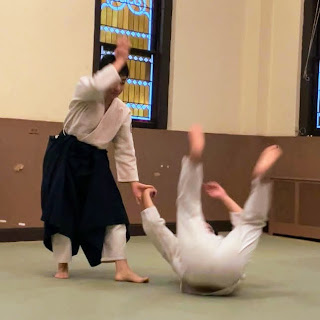Control Without Controlling
Our next door neighbors have two cute little children. The boy, Calvin, just turned four. He and I get along very well. Most days, if we find each other in the backyard, we usually run towards each other with open arms. He gives me a giant hug. In return, I give him his favorite "one thousand kisses on the neck". The little boy giggles as he wiggles. It is like music to my ears.
Calvin has a bit of a temper and can be quite defiant. To his mother's surprise, however, he tends to listen to me. He is not alone, though. Many friend's children listen to me. A friend was very surprised that her son would take a time out from me for five full minutes. "How do you do that? I can't even make him sit down!" she exclaimed.
During our dojo Saturday dinner, students asked how I do it.
"It's nothing extraordinary. It is actually pretty simple." I explained.
If kids make a fuss or resist, it is usually parents' own doing by being unclear and inconsistent. They confuse their kids by turning an order into an open-end question like "Do you want to . . . ?" Since they present it as an option, the kids make their choices, which is usually a "No". It catches the parents by surprise every time and they do not know what to do. They offered the kids a choice which they cannot take back. Out of desperation, they attempt to impose their preference on the kids. Understandably, the kids resist. It quickly elevates into a fight.
I try to be fair and to be very clear with children: If it is an option, I honestly let them choose. I may not have hidden preferences. After they have made a choice, I am not allowed to take it away. Kids trust you and respect you if you are fair with them, and they will be fair back.
In situations where I am giving kids an order, I make it very clear with my tone of voice and the way I phrase things. I will say: "Calvin, this is my friend Ben. Say hi to Ben." Kids can tell that this is not an option. I will never say "Hey, Calvin, this is my friend Ben. Do you want to say hi to Ben?" That is asking for trouble. Kids know that, because I -- the adult authority -- say so, no matter how they feel about my order, they have to comply right away. There is no room for negotiation. It is very important to train this reflex from kids for important and/ or dangerous situations.
Sometimes I even praise them before making the request/ order. If I say, "You are a very polite boy. Say hi to my friend, Ben," they always do it.
A student looked at me with eyes wide open, "I have to learn to do this at work!"
"Welcome to applied Aikido! This is what we have been trying to teach you all along." I chuckled.
"It is actually no different from how you present yourself in Aikido randori: If you stand there in a square stance, not presenting any particular side and part of yourself forward -- be it hand(s), shoulder(s), head, you are allowing your attacker to choose whatever attack they want. However, if I stand in left hanmi and hold my left hand out, what are the chances that they come to grab my right hand or shoulder? Will they choose to hit my head? Which side will they most likely hit?
Alternatively, if I hold both hands out, will they come to grab only one of my hands? Will they ignore my hands and insist on reaching to hit my head? By presenting myself a certain way, I already have exerted control over the choices of attacks available to them. I influence their actions without talking to them or touching them, simply by controlling myself."
A student asks, "Back to your story about children: What if the kids just won't do what you tell them to do?"
"It seldom happens. But if they try something mischievous, I only have to look at them. I look at them a certain way, and they already know to stop."
Students laughed.
Someone says, "Oh, have I seen that look before. . ." 😏
Another student suggests, "Maybe you just exude a vibe that makes them afraid of you?" 🤨
"Do I do that? Really? I thought I am kind of the nice, easygoing type. No?" I laughed. 😁
That was when our Member #001 says 😓 ," Well, we are all your students. How do you think we feel? Hmm . . . . "
😂😂😂😂😂😂



Comments
Post a Comment